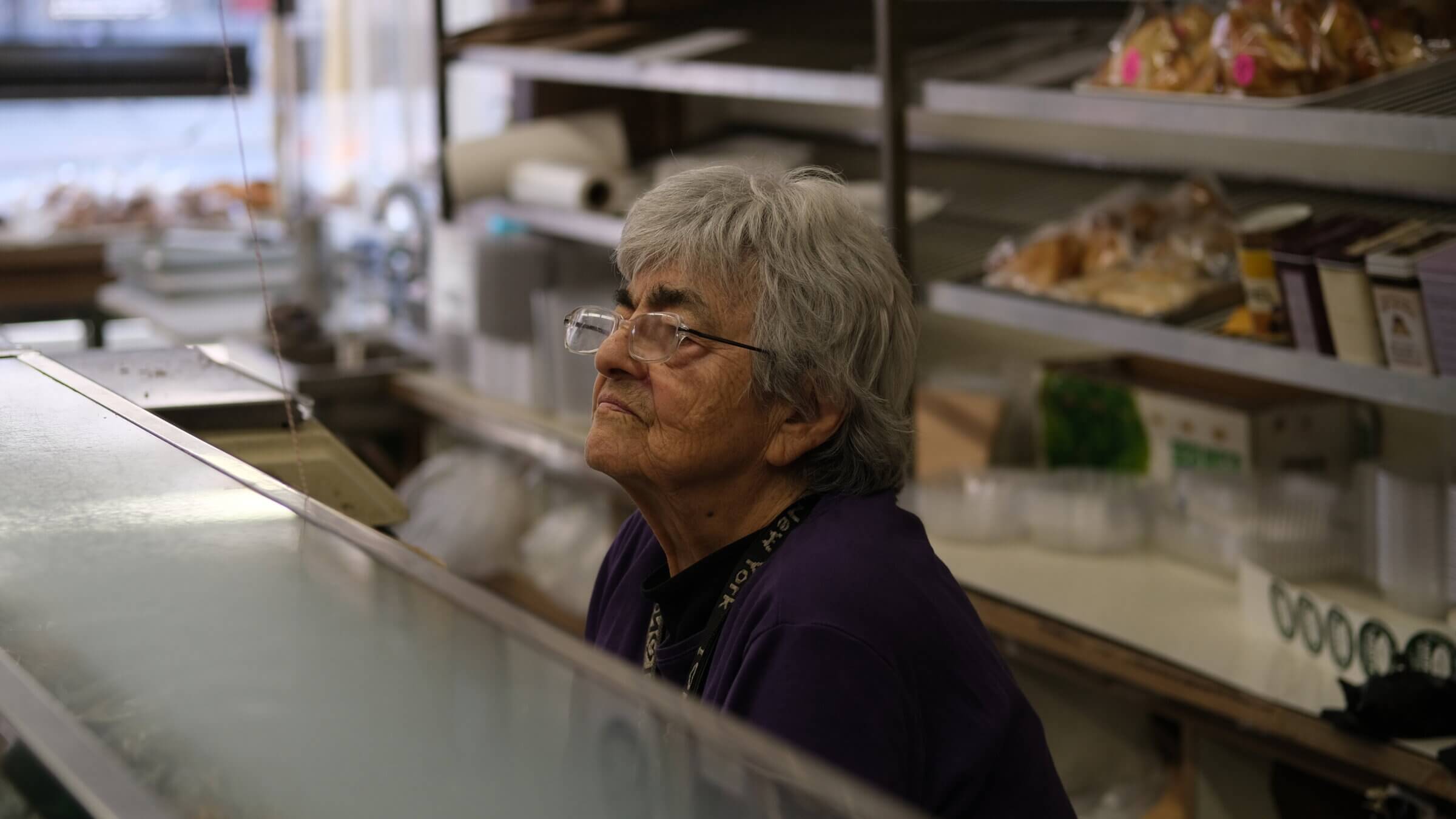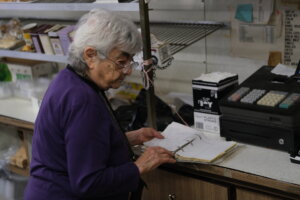At 95, Shaindel Schreiber is still dispensing babka and advice on the Lower East Side
For Schreiber’s loyal customers at Moishe’s Bakery on Grand Street, there are pastries, wisdom and good deals

Schreiber, behind the counter at Moishe’s Bakery. Photo by Stephen Gamss
As I walk over to Moishe’s Bakery on Manhattan’s Lower East Side to visit Shaindel Schreiber, the 95-year-old woman who works behind the counter, I pass a sign announcing the opening of an English-language show in what used to be the neighborhood’s Yiddish theater. I’m heading to the last traditional kosher bakery in the neighborhood, at 504 Grand Street, a spot that has been home to a kosher bakery since at least 1904.
When I arrive, a tour group is leaving, and Schreiber is standing at the front door. “Zay gezunt,” she says, waving. “That’s how we say goodbye. Be well.”
It’s a surprisingly warm day, and the bakery is overheated. Schreiber has taken off her late husband’s cardigan and is walking to take her seat on a stack of milk crates . “Show me your visa!” she calls out when she sees me. She loves teasing me for living on the west side of Clinton Street. To her, Clinton is the unofficial border between the Lower East Side, where I live, and the Shtetl, a tight-knit Jewish community where she lives and everyone is in everyone else’s business.
I laugh. “How’s your husband?” she asks.
She’s met my husband a couple of times, but once he was wearing new glasses and she didn’t recognize him. Horrified at the idea that she’d forgotten his face, she joked he was with the FBI and in disguise. Now, whenever he’s in the store, she asks everyone if they’re a criminal.
“Oh, he’s off finding thieves,” I reply.
“Good,” she says with a grin. “Quick, while he’s gone, send your kids to Yeshiva!”

Schreiber was born in Ciechanow, Poland, in 1929. She survived Russian prisons and German DP camps before taking a cargo plane to New York in 1955. She arrived with her husband and eldest son, who had polio. Because of his condition, she sent him to public school. Even though he is now a successful lawyer with “so many grandkids, he makes me a billionaire,” the decision not to send him to Yeshiva still weighs on her.
“Yeshiva is 100% better than public schools,” she tells me. “You have to send your kids to Yeshiva. There’s only so much you can teach your children at home.”
Schreiber was born around the time Orthodox Jewish women were being allowed by their community to attend formal Jewish schools,
“Did you go to a Yeshiva?” I ask.
“No,” she says. “My mother said all I needed was to know how to change diapers. And I was young; I didn’t know any better.”
“But you go to shul on Shabbat. How did you learn the prayers?”
“A rebbe came to my house and taught me the letters,” she explains. “That’s how it was done.”
A customer walks in and immediately asks about Schreiber’s home repairs. She has been trying to get a door installed in her bathtub because she struggles to climb in.
“Not good,” says Schreiber. “They quoted me $17,000.”
The customer is shocked. “Are you sure it wasn’t $1,700? Someone did it for my mother for $1,700.”
Schreiber doesn’t look convinced.
“I’ll get you the information,” the customer promises.
Customers keep interrupting. One brings Schreiber the dried cranberries she likes from Trader Joe’s. Another wants to know how her visit with her son went over the holidays.
“He did a good deed when he arrived,” she says, “and a second good deed when he left.”

Schreiber is a big fan of her independence. She spent too many years taking care of her husband when he had dementia, she tells me.
“The devil visits me too,” she says later when we’re alone. “Every day, the devil brings me pain, but I send him away. I say, ‘GET, you son of a gun,’ and I kick him out.”
“I talk to God every day, too,” she adds. “I say thank you for all the good you have given me and thank you for all the good you will give me.” Then she laughs, “Otherwise, he might forget about me!”
When I ask her for less spiritual advice — something practical for living a long and healthy life — she pauses.
“Go outside every day,” she declares, “and don’t eat preservatives.” She leans in like she’s sharing a secret. “In the supermarket, they sell you garbage. The food doesn’t get old. It isn’t good for you. It’s better if it gets old. When food gets stale, just warm it in the microwave for a few seconds — it’ll be fresh enough.”
She leans back, suddenly remembering another piece of advice. “And make everything into a joke.”
As if on cue, a customer walks in, picks up a tuna bagel from the fridge, and asks, “How much is this?”
“$300,” Schreiber replies.
“Oh, good! That’s cheap,” the customer responds with a grin.
As Schreiber helps the customer check out, a man from the neighborhood who looks like he might be homeless walks in. “Can I have a dollar?” he asks me.
Before I can respond, Schreiber jumps in, “Wait outside, and I’ll give you a coffee,” she says.
She takes a donut from the 50%-off pile, pours him a cup of coffee with a lot of extra sugar, and brings it to the door. “He likes a lot of sugar,” she tells me. “He can tell the difference if I don’t add it.”
When she sits back down, she explains, “It’s not only strangers from the street that I feed. If people ask for money, I don’t have to give it, but food, I have to give.”
Over the course of our conversation, customers walk in to pick up free-meals that were made by the local butcher. All they have to do is say hi, take a meal, and leave. At some point a longtime customer walks in with her granddaughter. They order a loaf of rye bread and some pastries, only to remember they’ve forgotten to bring cash to this cash-only establishment. They try to cancel their order.
“Take it and pay me later,” Schreiber insists. “But don’t come back today. I’ll be upset if you come back today. Only come when you can.”
Then, with a little flair, she tosses the loaf of bread over her shoulder — a habit she’s adopted since her shoulder locked up, making it hard for her to lift things above the counter.
As I’m getting ready to go, I ask Schreiber, “What’s new today?” I’m referring to the baked goods. Moishe’s gets fresh items from Williamsburg twice a day, and there’s usually something I haven’t tried before.
“Yogurt and pistachio muffins,” she says. “They’re milchig,” she warns me, since most things at Moishe’s are dairy-free.
She packages a babka, a mandel bread, and one of each muffin for me. Then I realize I’m $9 short.
“Don’t worry, I trust you,” Schreiber says, tossing my bag of food over the counter.
She pauses for a moment, seemingly remembering that I’m not a longtime customer — I’ve only been coming by for two weeks. “We trust everyone here”, she says with a grin.
I hand her the money, and start heading toward the doors. When I leave, I can hear her behind me, still laughing.















